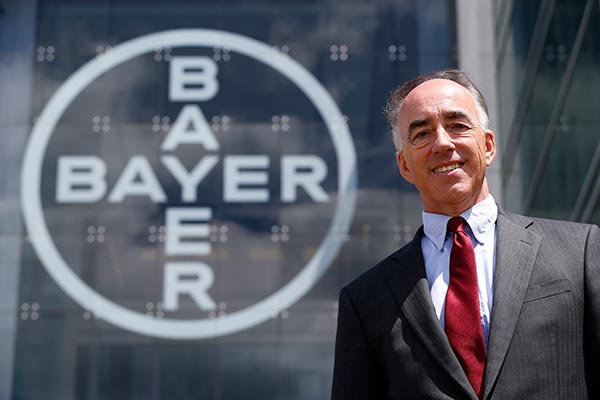 |
|
Phil Blake, Bayer's US president and head of pharmaceuticals for the Americas.[Photo/Agencies] |
Bayer AG is boosting its presence and brand in the United States, the world's biggest medicine market. Bayer is increasing everything from marketing and research operations in the US to the number of its nonprescription medicines in pharmacies and grocery stores.
The US expansion is part of the 153-year-old company's transformation from a chemical-and-dye manufacturer, a business it spun off last year, to a pure "life sciences" company focused on the health of people, pets and plants.
"I hope that over the next few years, people will learn that Bayer is more than aspirin," Phil Blake, Bayer's US president and head of pharmaceuticals for the Americas, said in an interview at its US headquarters in Whippany, New Jersey.
Bayer's strategy is a departure in an industry in which companies typically swim together in the same direction. Bayer is focused on expanding in the US, while other top drugmakers are concentrating on increasing sales and manufacturing in Asia and other developing markets.
The world's 14th-biggest drugmaker already sees signs its strategy is paying off. Last year, Bayer's sales jumped 28 percent to about $14 billion in the US and Canada, where consumer health sales soared 66 percent and prescription drug sales jumped 23 percent. Global revenue rose 12 percent, to nearly $51 billion.
"The US is the most important country for Bayer," said global innovation chief Kemal Malik.
Bayer, based in Leverkusen, Germany, boosted its research budget last year 21 percent to $4.7 billion. And it's doing more in two areas rivals have mostly abandoned despite huge unmet need and millions of patients: heart disease and women's health.
Bayer is doing more research collaborations in the US, like its deal with Johns Hopkins University to develop medicines for vision-damaging diseases. It also has a partnership with Massachusetts startup CRISPR Therapeutics, to develop new therapies for blood disorders, blindness and other conditions.
Across the US, Bayer has been hiring hundreds of scientists, factory workers and salespeople, and enlarging or building new research labs, offices and medicine factories.
It funds a San Francisco "incubator" housing startups developing experimental medicines and related technology. And it's pouring $1 billion into new greenhouses, factories for crop-protecting chemicals and development of seeds that can withstand climate change.
A key part of Bayer's US strategy is expanding its consumer health business.
That's been driven by its 2014 purchase of Merck & Co's consumer health unit for $14.2 billion. The combined business vaulted to No 1 in US consumer health sales, surpassing Johnson & Johnson.
Iconic Bayer aspirin, patented in 1899, holds 62 percent of US market share among aspirin brands. Sales are still growing, up 7 percent last year to $520 million worldwide.
Pain relievers and vitamins aren't sexy, but they have appeal: Development costs are low, advertising can quickly boost sales, products attract few lawsuits compared to prescription drugs, and they sell steadily for decades.
Bayer now markets 170 consumer health products, 17 with annual sales topping $100 million.
The expanded consumer health portfolio now holds more prized eye-level supermarket and pharmacy shelf space, which boosts sales. Bayer now markets the former Merck brands worldwide, which helped it increase total consumer health sales 30 percent last year.
Bayer is a leader in women's health, selling Yaz, Yasmin and other birth control pills; Mirena and other intrauterine devices, and Essure, an implant for permanently preventing pregnancy. Last month, US regulators required that Essure bear its strictest warning, noting chronic pain and bleeding in some users, and ordered Bayer to conduct new safety studies.
It has recently become a contender in cancer medicines, jumping from one a decade ago to three today, with two dozen more in patient testing, innovation chief Malik said.
Meanwhile, under a new partnership with the American Association for Cancer Research, Bayer will give US scientists grants to transform ideas for new cancer targets into medicines.
